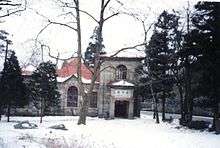Guling, Jiangxi
Guling (Chinese: 牯岭), postal romanization Kuling, is a resort town in Lushan City, Jiangxi Province, China.[1] It is the tourist and administration center in the Lushan National Park (Mount Lu), a World Heritage Site.[2]
Guling 牯岭镇 | |
|---|---|
Town | |
| Coordinates: 29°34′13″N 115°58′36″E | |
| Country | People's Republic of China |
| Autonomous Region | Jiangxi |
| Prefecture-level city | Jiujiang |
| County-level city | Lushan |
| Time zone | UTC+8 (China Standard) |

As of 2018, it has 5 residential communities, 2 villages, and 4 other neighborhoods under its administration.[3]
History
Guling on the slopes of a wide valley of Mount Lu, was established in 1895 by the missionaries Edward Selby Little, Dr. Edgerton Haskell Hart and three others, as a sanitarium and rest resort for Western missionaries in southern China. They built their houses in the colonial style of architecture, and added a church, schools, and sports facilities. It was named by Little, as a pun: it is wonderfully cooling after the summer heat in the plains below. It was also a word that sounded conveniently Chinese to the local people, and has been adopted by them. Kuling was run by the missionaries in a Kuling Council that sold the plots of the land and with the proceeds paid for local services and security. In 1910, Caroline Maddock Hart and four others met to found the Nurses Association of China; with Caroline Maddock Hart being its first president. In 1936, when most of the missionaries left before the Japanese invaded, Lushan was returned to Chinese jurisdiction.
Prior to 1949, President Chiang Kai-shek chose Lushan as the summer headquarters for his nationalist Kuomintang government, having been introduced to the place by his wife Soong Mei-ling, the daughter of a Shanghai Methodist minister. It was here that in 1946 the U.S. special diplomatic mission representing the President of the United States led by General George C. Marshall met with Chiang Kai-shek to discuss the role of post-World War II China.
After the communist revolution in China in 1949, it became favourite meeting place for the Central Committee of the Communist Party of China because Chairman Mao used Chiang Kai-shek's house as one of his holiday homes. It hosted the Eighth Plenum of the Eighth Central Committee, also known as the Lushan Conference or "Plenum", which began on 23 July and convened on 2 August, 1959. Guling also hosted the Second Plenum of the Ninth Central Committee in August 1970.
The movie Lushan Lian, which has been shown in the Lushan theatre non-stop since 1980, was recognised by Guinness World Records as the longest running movie in theatres. Each ticket sold to this movie is numbered according to ticket sales to date. As of May 2006, this number is close to 140 million tickets.
The town was the birthplace of English author Mervyn Peake, and the town where the Nobel Prize-winning novelist Pearl Buck met her future husband.
References
- 2018年统计用区划代码和城乡划分代码:庐山市 (in Chinese). National Bureau of Statistics of the People's Republic of China. Retrieved 2019-03-08.
- "Guling". Tuniu. Retrieved 10 July 2017.
- 2018年统计用区划代码和城乡划分代码:牯岭镇 (in Chinese). National Bureau of Statistics of the People's Republic of China. Retrieved 2019-03-08.